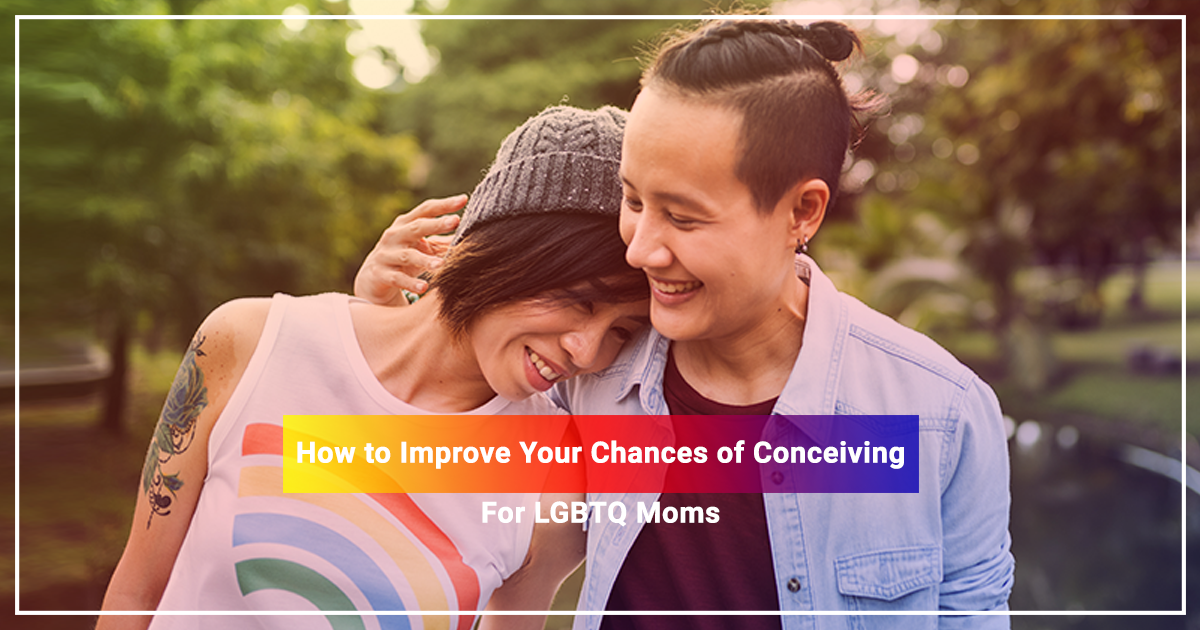How to Improve Your Chances of Conceiving | For LGBTQ Moms
August 19th, 2019 | 5 min. read
By Monica Moore


There can be many challenges that single moms or female couples face while they’re trying to conceive. On top of your day to day work and home life, additional appointments and questions about insurance may seem stressful as you try to build your family.
That’s why we want to give you tools and information to stay healthy and well during this time period – to maintain what we call preconception health, not only to increase your chance of conceiving but to possibly reduce pregnancy-related risks to you and your baby.
In this article we’ll first explain why maintaining a healthy weight & lifestyle can help improve your health and the health of your child during and after pregnancy. Then, we’ll explore the 5 strategies to help you get there!
- Movement
- Hydration
- Stress management
- Sleep
- Sustainable (for you!) nutrition
Historically, doctors have urged all prospective parents – but especially cisgender women – to achieve a healthy weight, as obesity can contribute to infertility and some pregnancy complications. However, studies show that losing weight quickly utilizing unhealthy, unsustainable methods (like crash diets) may NOT improve pregnancy rates. What can help? Working on your ‘inside’ and not just focusing on a number on the scale.
Simply put, improving your metabolic factors (think insulin sensitivity or reduced inflammation) and limiting weight gain is key during this time. But sometimes, achieving these two things can feel anything but simple.
Especially when you have an endocrine condition, like PCOS.
Insulin resistance and the resulting elevated insulin levels that many PCOS patients experience favor fat storage -- which makes it easy to gain weight and difficult to lose excess weight. This evolutionary adaptation was great in the hunter-gatherer days when we lived in caves and food was scarce. But today, in a world where processed food is plentiful, it can be difficult to combat.
For many women who struggle with weight, your brain’s perception of the hormones that regulate energy balance is distorted. This makes it hard to tell whether you’re hungry or full, and makes eating ‘intuitively’ relatively impossible for some. But here’s the good news. While you’re working with a fertility specialist to figure out your path to parenthood, it’s the perfect opportunity to work on ways to achieve the healthiest ‘you’ prior to pregnancy. Here are some manageable ways that you can improve your health as you’re thinking about biological LGBTQ family building.
1. Engage in regular movement past the point of discomfort
Notice that I didn’t use the word “exercise.” There is no perfect blueprint for this. We realize that it can be daunting to go to a formal, scheduled class with 24 other sweaty gym-goers. Don’t worry, that’s not necessary! The fact is that if when many people start an exercise routine they don’t enjoy or makes them feel uncomfortable, they don’t often follow through. So where can you start? Make goals and pick something you will like to do, that elevates your heart rate and helps you feel stronger. Challenge yourself to walk a specific distance or do yoga at home with a video or an app. Determine the number of days you want to do this activity every week and make it a priority. Map it out, and stick to it. Make the last 5-10 minutes of the activity tough. Not like throw-up-tough, but difficult enough that you have to think of something inspiring to get you through. This quality of movement or activity is a powerful weapon. It generates physical changes to your body, such as an increase in insulin sensitivity (take that, PCOS!) and metabolic rate. This lifestyle change can help you both achieve a pregnancy and have a healthy baby. What might be even more important? The mental benefits. In addition to generating those ‘feel good’ hormones in the brain that last beyond your movement session, activity past the point of comfort sends a powerful message that your body (and you!) can prevail, even flourish, under difficult circumstances, a helpful thought process for infertility treatments.
2. Hydrate
We all know the importance of being well-hydrated in life – it’s vital to our mental and physical health! Even so, this can be a tough habit to maintain. People who have insulin resistance can’t always rely on the hunger/satiety receptors in our brain to work properly, so there is a need to focus on the stretch receptors in the stomach.
As you eat, the stomach expands by activating these stretch receptors and ultimately tells the body to stop eating when “full.” By drinking water prior to and with meals, (and eating slowly!) you are giving these stretch receptors time to tell the brain to stop. Now, we just need to listen to it.
3. Manage stress
So, undergoing infertility treatments is often stressful. Then we take your wine and other forms of stress release away from you because those things aren’t allowed when you’re trying to get pregnant. Simple math shows that increasing stress but limiting the way to release it results in…more stress.
Movement helps. Getting outside more often helps. Journaling, writing, reading, gardening or whatever resonates with you helps. Whatever makes you happy and breathe a little easier, it all helps. Having a community of people who understand helps. Meditation and mindfulness helps. If you’re not sure how to do these, there are some great apps you should download, such as Calm and Headspace. These can also help you sleep better. Speaking of sleep…
4. Make sleep (and what you do before you go to sleep) a priority
Stress negatively affects quality sleep. Excess weight can cause sleep apnea which can cause disordered eating and lead to, you guessed it, excess weight. Sleep apnea is present in up to 80% of patients who have PCOS and obesity. One step is to have a sleep study done to see if you have this and need a breathing device to assist you. Also, sleep hygiene is important. Sleep hygiene is what you do (and don’t do) before you fall asleep. Turn off electronics at least 30 minutes prior to falling asleep, maintain a comfortable temperature in the room, consider a weighted blanket…
All these things will promote a better quality of sleep, which is critical to a healthy lifestyle. Can you guess what helps you sleep better? Movement and good nutrition.
5. Find a way of eating healthfully that works for you
There is no particular diet that is recommended for women trying to conceive. The closest to ideal is probably a variation of the Mediterranean diet, which emphasizes combining lean proteins with healthy fats and low GI index carbs (brown rice over white rice, for example). By not eating high GI carbs and not eating carbs by themselves, you are tempering the insulin response to your food and minimizing the ‘hangry’ spikes that result from it.
In fact, the best diet isn’t a diet at all. It’s a lifestyle change. Eat in a way that makes your body feel good, and your mind feel alert and balanced. Going on Pinterest or following inspiring role models on Instagram can give you lots of ideas for healthy food options. Once you know what you like, and what works for you in terms of how it makes you feel, make your own online cookbook or journal of your favorite recipes. Bring it to the supermarket so you can select targeted foods and not go down each aisle that contain numerous temptations.
Be patient with yourself. It takes at least 6 weeks to form a new habit, and changing bad habits is tough and time-consuming, but worth it. Also, after making some of the changes listed above, you may notice a decrease in weight or body fat % as an added benefit. Even if these habits don’t result in weight loss, it helps set you up for your next goal: conceiving.
But your healthy lifestyle efforts don’t stop once you’re pregnant. In order to reduce risks to you and your baby, they need to continue throughout your pregnancy. Making all these adjustments might feel daunting, but by breaking them down into small, achievable goals, you can form the positive habits that will set you up for success during pregnancy and beyond.
Monica Moore As a nurse practitioner, Monica received advanced nursing education in addition to being a registered nurse. She is a fully licensed registered nurse and Advanced Practice Nurse Practitioner in the state of Connecticut and is certified by the board of the American Academy of Nurse Practitioners. Monica’s nursing work experience spans nearly two decades in the field of fertility treatment. Monica’s passion lies in taking care of the whole patient. Monica works with patients and stresses the importance of integrating comprehensive care – including yoga, acupuncture, massage therapy and nutrition – with fertility treatment.
